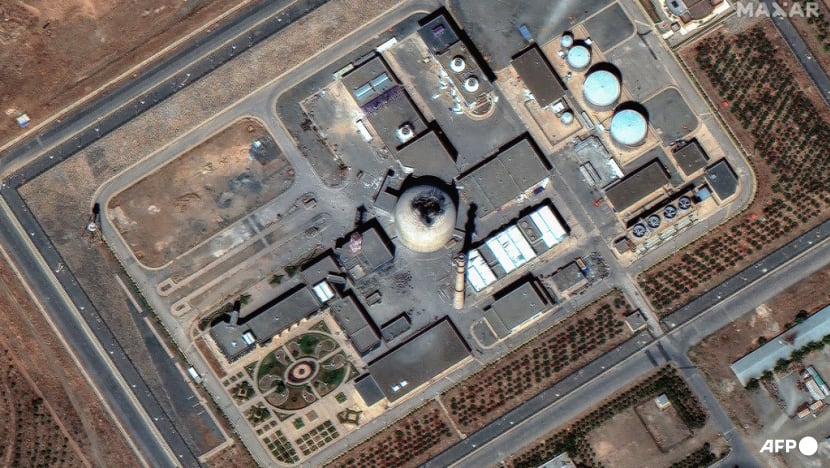Israel says it killed three Iranian commanders in fresh wave of strikes

This handout satellite image released by Maxar Technologies on Jun 19, 2025 shows damage at the Iranian nuclear facility at Arak in central Iran, after an Israeli strike. (File photo: AFP)
JERUSALEM: Israel said on Saturday (Jun 21) it had killed three more Iranian commanders in its unprecedented bombing campaign across the Islamic republic, which Foreign Minister Gideon Saar claimed had delayed Tehran's alleged progress towards a nuclear weapon by two years.
Israel's military said a strike in Qom south of Tehran successfully targeted top Iranian official Saeed Izadi, in charge of coordination with Palestinian militant group Hamas, adding two other commanders from Iran's Revolutionary Guards were also killed overnight.
As Israel continued to strike Iran's nuclear facilities and military targets, Saar said in an interview that by his country's own assessment, it had "already delayed for at least two or three years the possibility for them to have a nuclear bomb".
"We will do everything that we can do there in order to remove this threat," Saar told German newspaper Bild, asserting Israel's onslaught would continue.
Israel and Iran have traded wave after wave of devastating strikes, after Israel launched its aerial campaign on Jun 13, fearing Tehran was on the verge of developing a nuclear weapon - an accusation the Islamic republic has denied.
Israel said it had attacked Iran's Isfahan nuclear site for a second time after its air force announced it had also launched salvos against missile storage and launch sites in the centre of the country.
The army later said it was striking military infrastructure in southwest Iran.
United States President Donald Trump warned on Friday that Tehran had a "maximum" of two weeks to avoid possible American air strikes, as Washington weighs whether to join Israel's campaign.
"NOT PREPARED TO NEGOTIATE"
Iranian Foreign Minister Abbas Araghchi arrived in Istanbul on Saturday, for a meeting of the Organisation of Islamic Cooperation to discuss the conflict.
Top diplomats from Britain, France and Germany met Araghchi in Geneva on Friday, and urged him to resume talks with the United States that had been derailed by Israel's attacks.
But Araghchi told NBC News after the meeting that "we're not prepared to negotiate with them (the United States) anymore, as long as the aggression continues".
Trump, dismissive of European diplomatic efforts, also said he was unlikely to ask Israel to stop its attacks to get Iran back to the table.
"If somebody's winning, it's a little bit harder to do," he said.
Any US involvement would likely feature powerful bunker-busting bombs that no other country possesses to destroy an underground uranium enrichment facility in Fordo.
A US-based NGO, the Human Rights Activists News Agency, said on Friday that based on its sources and media reports at least 657 people have been killed in Iran, including 263 civilians.
Iran's health ministry on Saturday gave a toll of more than 400 people killed and 3,056 injured in the Israeli strikes.
Nasrin, 39, who was receiving treatment at Hazrat Rasool hospital in Tehran and who gave only her first name, said she had been thrown across a room in her home by an Israeli strike on the Iranian capital.
"I just hit the wall. I don't know how long I was unconscious. When I woke up, I was covered in blood from head to toe," she told AFP from her hospital bed.
"PURE SPECULATION"
Traffic police and Fars news agency reported congestion on roads into Tehran on Saturday, indicating some inhabitants were returning to the capital.
Internet access remained highly unstable and limited in Tehran on Saturday, with slow connections and many sites still inaccessible, according to AFP journalists.
Iran's retaliatory strikes have killed at least 25 people, in Israel, according to official figures.
Overnight, Iran said it targeted central Israel with drones and missiles.
Israeli rescuers said there were no casualties after an Iranian drone struck a residential building in Beit She'an.
At the site of the strike in the north of Israel, mounds of soil had been gouged from the ground and the wall of a ground-floor room was destroyed.
Israel's National Public Diplomacy Directorate said more than 450 missiles have been fired at the country so far, along with about 400 drones.
Iran's Revolutionary Guards said they had targeted military sites and air force bases.
In Tel Aviv, where residents have faced regular Iranian strikes for nine days, some expressed growing fatigue under the constant threat from Iran.
"In the middle of the night, we have to wake the children and take them to the shelter," Omer, who gave only his first name, told AFP.
"They are tired all day after that," he added, explaining he still supported Israel's war aim of denying Iran a nuclear weapon.
Western powers have repeatedly expressed concerns about the expansion of Iran's nuclear programme, questioning in particular the country's accelerated uranium enrichment.
International Atomic Energy Agency chief Rafael Grossi has said Iran is the only country without nuclear weapons to enrich uranium to 60 per cent.
However, he added that there was no evidence Tehran had all the components to make a functioning nuclear warhead.
Grossi told CNN it was "pure speculation" to say how long it would take Iran to develop weapons.















